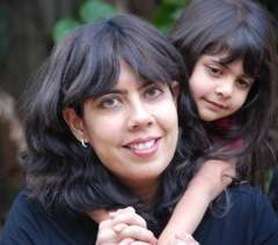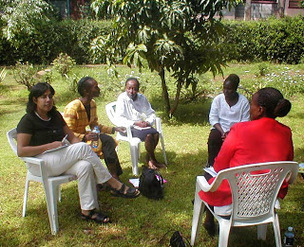 I once attended a one-day writing workshop. At the end of the day the leader asked us to visualize where we would like to be in ten-years time in our writing careers. He probably suggested a book signing as one possibility. By that time I had done at least one book signing for my first YA novel, The Wooden Ox. The desire to do writing workshops in Africa may have already been in my mind. What I remember is picturing the book signing of one of my students. Recently I have gone one better—one of my Kenyan students was short-listed for the Golden Baobab Award for African Children’s Literature. Shaleen Keshavjee-Gulam and I met at a writing workshop sponsored by Word Alive Publishers in Nairobi, Kenya. I admit, we were a bit wary of each other at first. Shaleen is from the Kenyan Muslim community. She and the cousin who came with her had not recognized Word Alive as a Christian publisher in the advertising. Although Shaleen had spent six years in Catholic school, I suspect she was a bit afraid of getting Christianity pushed down their throats or worse in a country that is often divided along tribal and cultural lines. For my part, I had come to teach Kenyan Christians to reach children more effectively. Was I willing to do the same for Muslims? In the end I discovered that we shared many moral values as well as a love for children and stories. In class and around the tea table we got to know each other and respect one another’s faith communities.  Shaleen (left) in a critique group at that original Word Alive workshop. Mary Kiio (center) has also published books since then. Shaleen (left) in a critique group at that original Word Alive workshop. Mary Kiio (center) has also published books since then. Shaleen has attended several other writing workshops, both mine and with other teachers, and had a couple romance novels published by a Kenyan digital publisher under the pseudonym Kiki Kalenga . Recently Shaleen was short listed for the Golden Baobab Award for African Children’s Literature along with authors from Ghana, Zimbabwe and elsewhere. I asked Shaleen if she would share a bit with us about her writing. Shaleen, you had obviously thought about writing before you came to that first Word Alive workshop. What sparked your interest? Shaleen Keshavjee-Gulam: I have always wanted to write, but had no idea how to go about it. This was the very first workshop I had ever attended. This workshop kindled a passion for writing and allowed me to take my writing to the next level. LH: Why write for children? SK: I have always been an avid reader and with two young daughters I am always having to come up with new bedtime stories. LH: Tell us a little about Malaika’s Magical Kiosk. SK: Michelle is not a very happy little girl. Her mother has gone away to take care of her grandmother and left her with her bossy big sister. Everyone in the village is bad tempered because the rains are late and the food crops may die. But then a mysterious stranger arrives and sets up a wonderful kiosk. There is a change in the air and incredible things begin to happen. LH: Mysterious strangers always mean exciting change! Sounds interesting. Kenya is a very culturally diverse country. How do you appeal to a wide audience in that context? SK: I think it's really important for African children to be able to see themselves in the books they read. But yes we have huge diversities in Kenya, both between rural and urban children as well as a huge socio-economic divide. LH: What do you do in your writing to embrace that diversity? SK: I always try and leave ethnicity vague, as I don’t want to bring to mind tribal-stereotypes when people are reading the story. I also often choose character names that are not associated with a particular tribe. I have written stories about people from different socioeconomic backgrounds. LH: Your romance had to be an urban setting. That was part of the publisher’s guidelines. Do you set your children’s stories in urban or peri-urban areas where so many Kenyans live today or do you leave that open? SK: It just depends on where the story takes me. My new book <i>Shani’s Choice</i> is about a girl from the city and Malaika’s Magic Kiosk is set in rural Kenya. LH: How does being Muslim affect your writing? SK: Religion has never really come into my writing. My new book for teens, Shani's Choice, involves a moral dilemma which should be universal to anyone with ethics, regardless of religious affiliation. LH: You have also published an adult romance novel set in Nairobi. Other than the obvious content, how is writing for children different from writing for adults in your mind? SK: I enjoy writing for children far more. Romance novels generally tend to follow a predetermined template, and there is not that much room for deviation. I am enjoying experimenting with magical realism at the moment and with children's stories imagination has no boundaries. Doing the romance novel, was a good writing exercise, but romance is really not my genre. LH: Do you have any other works in progress you can tell us about? SK: Shani’s Choice is being published in Kenya as part of Storymoja’s <i>Life Skills Series</i> for young adults. It should be out in a few months time. I am currently doing an on-line course in Writing Fiction for Young Adults from Oxford University and hope to develop a novel out of this amazing course. So far I only have an outline and the beginning of a YA story – which is about dragons! I have published the romances under a pseudonym, as this is really not my genre. LH: Thank you, Shaleen. Shaleen did not win the Golden Baobab Award this year, but being short-listed is a major affirmation of her writing and her representation of the continent. Congratulations, Shaleen! I couldn’t be prouder!
0 Comments
Leave a Reply. |
AuthorLeAnne Hardy has lived in six countries on four continents. Her books come out of her cross-cultural experiences and her passion to use story to convey spiritual truths in a form that will permeate lives. Add http://www.leannehardy.net/1/feed to your RSS feed.
To receive an e-mail when I post a new blog, please subscribe.
Categories
All
Archives
November 2022
|
 RSS Feed
RSS Feed